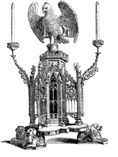
Icons, Relics & Pilgrimages: A Secular Defense
GUEST COLUMN
The veneration of icons and relics finds its origin in human rationality and reason. Yet the secular world disparages this act of piety as irrational, misconstruing icons as idols, veneration as worship, and the miraculous as superstition. This despite everyday life bringing about states of mind indistinguishable from veneration but without evoking the attendant charge of irrationality.
Relics are objects rendered holy by their origin and history. Icons are usually pictorial representations rendered holy by their association with the miraculous. Japanese art historian Akira Akiyama observes that relics are dividable but not duplicable. Icons are duplicable but not dividable. In both cases, value derives not from material composition but from immaterial attributes. The immaterial is recognized as real. This is not some idle speculation but a felt reality — even by people living strictly secular lives.
By way of example, in the early 1990s, a Leeds property developer paid £100,000 for a painting entitled Nude, 1909-10 by Marc Chagall. The provenance was not impeccable, but the painting did appear in the 1989 book Chagall: The Russian Years 1907-1922 by Aleksandr Kamensky, a friend of Chagall. Two decades later, the developer became concerned when a subsequent reprinting of Kamensky’s book omitted the painting he had purchased. Based on provenance, connoisseurship, and forensic analysis, the painting was determined to be a fake. Taking inflation into consideration, the value of the painting dropped from the equivalent today of £237,070 ($301,900) to zero. Why? The painting itself had not changed.
You May Also Enjoy
The liturgy does not try to create or evoke emotions but expects them to grow from our recognizing and feeling the truths the ritual expresses.
Pope Gregory’s program was really quite simple: To return to the people of Rome a sense of sin and a sense of the sacred.
The Church is the mother of Christendom. She encompasses all modes of life, from economy to culture, from politics to family relations.

